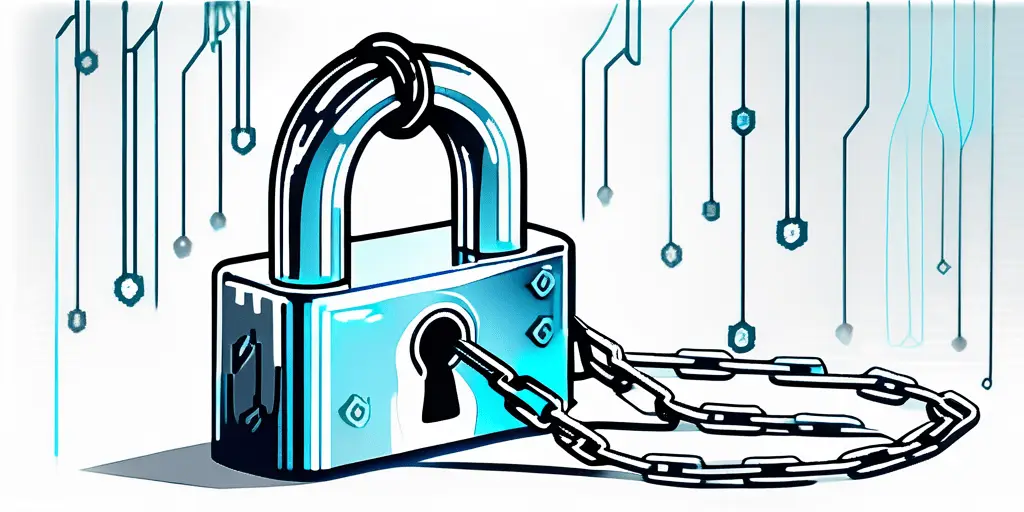In cybersecurity, ensuring the integrity and security of data is of paramount importance. One emerging concept that is gaining significant traction is the use of immutable data. This article will delve into the significance of immutable data in cybersecurity and explore its various aspects.
Understanding Immutable Data
Before diving deeper, let’s first clarify what immutable data entails. Essentially, immutable data refers to information that cannot be altered or modified once it is created. It remains constant and unchangeable throughout its lifecycle, ensuring that any modifications would require the creation of an entirely new instance.

So, what are the characteristics that make immutable data so valuable in cybersecurity? Let’s find out.
Definition and Characteristics of Immutable Data
Immutable data starkly contrasts its mutable counterpart, where changes can be made at any time. The immutability of data provides several key benefits in terms of security and integrity.
First and foremost, immutable data safeguards against unauthorized modifications. By making data tamper-proof, malicious actors can no longer manipulate or alter critical information. This becomes particularly crucial when dealing with sensitive data and protecting against cyberattacks.
Immutable data enhances transparency and audibility. Since the data cannot be modified once created, any changes made to it can be easily traced and detected. This audit trail becomes invaluable in determining the source and nature of any unauthorized alterations, aiding in investigations and reducing the impact of security breaches.
Additionally, data’s immutability promotes consistency and reliability. With mutable data, there is always a risk of concurrent modifications leading to inconsistencies or conflicts. However, with immutable data, these concerns are minimized, as each instance of data remains unchangeable, ensuring that all users have access to the same, accurate information.
The Role of Immutable Data in Information Technology
Immutable data also plays a critical role in the broader field of information technology. It forms the foundation of various data-intensive applications, such as blockchain technology. The immutable nature of data ensures the integrity of transactions and eliminates the possibility of fraud or manipulation within decentralized systems.
Immutable data enables efficient data sharing and collaboration. When multiple users or systems need access to the same information, the immutability of data ensures that everyone is working with a consistent and reliable dataset. This promotes seamless collaboration, reduces conflicts, and enhances overall productivity.
The use of immutable data can lead to improved performance and optimization. Since immutable data does not change, it can be cached and reused, reducing the need for frequent database queries or calculations. This caching mechanism can significantly enhance the speed and efficiency of data-intensive operations, making them more scalable and cost-effective.
Immutable Data and Cybersecurity

How Immutable Data Enhances Cybersecurity
Immutable data serves as a powerful tool in bolstering cybersecurity defenses. By employing this concept, organizations can ensure the integrity and trustworthiness of their data, even in the face of sophisticated cyber threats.
One key advantage of immutable data is its ability to prevent data tampering. As mentioned earlier, it cannot be modified once data is created. This ensures that any attempts to alter or manipulate critical information are immediately flagged and detected. By eliminating the possibility of unauthorized modifications, immutable data is a robust defense mechanism against cyberattacks.
Data’s immutability also enhances data recovery and forensics capabilities. In the event of a security breach or data loss, having immutable data provides a reliable source of truth. It enables organizations to reconstruct an accurate timeline of events and recover compromised data with confidence.
Potential Risks and Challenges
While immutable data offers significant advantages in cybersecurity, it is important to acknowledge the potential risks and challenges associated with its implementation.
One potential challenge is dealing with immutable data’s scalability and performance implications. As data grows exponentially, the storage and processing requirements can become substantial. Organizations must carefully consider the infrastructure and technologies required to handle large volumes of immutable data effectively.
Another consideration is the regulatory and compliance landscape surrounding immutable data. Different jurisdictions have varying requirements and restrictions when it comes to data storage and integrity. Organizations must remain compliant with relevant regulations while implementing immutable data solutions.
Emerging Technologies and Immutable Data
As technology continues to advance, new opportunities arise for applying immutable data in cybersecurity. One emerging technology that holds promise in this regard is blockchain.
Blockchain is a decentralized and distributed ledger technology, most commonly associated with cryptocurrencies like Bitcoin. It provides a transparent and tamper-proof record of transactions, making it an ideal platform for implementing immutable data solutions.
Leveraging blockchain technology, organizations can create a secure and immutable data ecosystem. Each transaction or data entry is recorded in a block, which is then linked to the previous block, forming a chain. This ensures that any modifications or alterations to the data are easily detectable, as they require changing every subsequent block in the chain.
Blockchain technology also offers enhanced privacy and confidentiality features. With cryptographic techniques, sensitive information can be securely stored and accessed only by authorized parties, further strengthening cybersecurity measures.
The Future of Immutable Data in Cybersecurity
As the digital landscape continues to evolve and cyber threats become more sophisticated, the importance of immutable data in cybersecurity will only grow. Organizations must recognize the value of maintaining data integrity and invest in technologies and strategies that ensure the immutability of their critical information.
With the increasing adoption of emerging technologies like blockchain, the implementation of immutable data solutions will become more accessible and widespread. This will enable organizations to stay one step ahead of cybercriminals and protect their data from unauthorized access or tampering.
Implementing Immutable Data in Cybersecurity

Implementing immutable data requires a systematic approach to ensure its successful integration into existing security frameworks. Here are some key steps to consider:
- Assessing data requirements: Begin by identifying critical data elements that require immutability. Not all data may need to be immutable, so a thorough analysis is crucial. For example, customer personal information and financial transactions are prime candidates for immutability, as any unauthorized changes can have severe consequences.
- Selecting suitable technologies: Explore the available tools and technologies that facilitate the implementation of immutable data. Blockchain platforms, for example, offer robust features for ensuring data integrity. These platforms use cryptographic algorithms and distributed consensus mechanisms to create an immutable record of transactions, making it extremely difficult for malicious actors to tamper with the data.
- Designing data governance policies: Establish policies and guidelines that govern immutable data creation, access, and retention. This ensures consistency and adherence to security protocols. Data governance policies should outline who has the authority to create and modify immutable data and the procedures for auditing and monitoring any changes made.
- Implementing secure data storage: Leverage secure storage mechanisms to protect immutable data from unauthorized access or tampering. Encryption and access controls are essential components of a robust storage infrastructure. Additionally, organizations should consider implementing redundancy measures, such as data replication and backup, to ensure the availability and durability of immutable data.
Tools and technologies play a crucial role in implementing immutable data solutions. Here are some examples:
- Blockchain platforms: Blockchain technology provides a decentralized and transparent framework for ensuring data integrity and immutability. By leveraging a distributed network of nodes, blockchain platforms create a tamper-proof record of transactions, making them ideal for storing immutable data.
- Digital signatures: Employing digital signature algorithms can add an extra layer of security to immutable data, making it resistant to unauthorized modifications. Digital signatures use cryptographic techniques to verify the authenticity and integrity of data, assuring that the data has not been tampered with.
- Data backup and recovery solutions: Implementing robust backup and recovery mechanisms safeguards against data loss and enables the restoration of immutable data in the event of a cyber incident. Regularly backing up immutable data to secure off-site locations ensures its availability even in the face of hardware failures, natural disasters, or malicious attacks.
By following these steps and utilizing the right tools and technologies, organizations can effectively implement immutable data solutions, enhancing their cybersecurity posture and protecting critical information from unauthorized modifications.
The Future of Immutable Data in Cybersecurity
As the field of cybersecurity continues to evolve, it is essential to explore the future implications and potential innovations regarding immutable data.
Immutable data, with its ability to protect against unauthorized modifications and enhance data integrity, is set to have far-reaching implications for cybersecurity. Its importance cannot be overstated, as it provides a powerful defense against cyberattacks.
Emerging Trends and Innovations
One noteworthy trend is integrating artificial intelligence and machine learning algorithms in analyzing immutable data. These technologies enable the greater accuracy and efficiency of the detection of anomalous behavior and potential security threats. By leveraging AI and ML, organizations can stay one step ahead of cybercriminals and respond swiftly to emerging threats.
Advancements in blockchain technology are expected to drive the adoption of immutable data solutions across industries. Blockchain’s decentralized nature and cryptographic algorithms make it an ideal platform for storing and securing immutable data. As organizations gain a better understanding of blockchain’s potential, we can anticipate more innovative use cases and applications in cybersecurity.
For instance, imagine a scenario where a financial institution securely stores its transactional data on a blockchain. The immutability of the data ensures that any tampering attempts are immediately detected, preventing fraudulent activities. This level of data integrity instills trust and confidence in customers, enhancing the organization’s overall security posture.
Predictions and Implications for Cybersecurity
The rise of immutable data is expected to revolutionize cybersecurity practices. With its ability to ensure data integrity and transparency, we can expect a significant reduction in the frequency and impact of cyberattacks. By implementing immutable data solutions, organizations can create an environment where data tampering becomes nearly impossible, deterring potential attackers.
However, it is crucial to remain vigilant in the face of evolving threats and challenges. While immutable data provides a powerful defense, it should be complemented by comprehensive security practices, threat intelligence, and proactive monitoring. Cybercriminals constantly adapt their tactics, and organizations must stay ahead of the curve to protect their valuable assets.
Adopting immutable data solutions requires careful consideration of privacy and compliance regulations. Organizations storing and sharing sensitive information must adhere to legal requirements and industry standards. This includes implementing robust access controls, encryption mechanisms, and data retention policies.
Conclusion
The importance of immutable data in cybersecurity cannot be overstated. Its ability to protect against unauthorized modifications and enhance data integrity makes it a vital component of any robust security framework. Organizations can leverage immutable data to fortify their defenses and safeguard critical information by exploring its various aspects and understanding its application.
As we’ve explored the critical role of immutable data in cybersecurity, the need for expert guidance and robust solutions becomes clear. With its comprehensive B2B services and deep expertise in medical device cybersecurity, penetration testing, and compliance, Blue Goat Cyber stands ready to be your partner in this endeavor. Our Veteran-Owned business is committed to protecting your operations from cyber threats with a proactive and personalized approach. Don’t let the complexities of cybersecurity hinder your success. Contact us today for cybersecurity help and take the first step towards securing your digital assets with Blue Goat Cyber’s trusted solutions. Embrace the future of cybersecurity with confidence.
